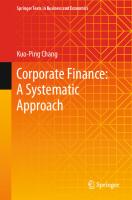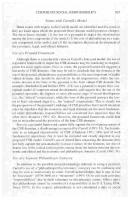A Christian Approach to Corporate Religious Liberty 9783030562106
This book addresses one of the most urgent issues in contemporary American law―namely, the logic and limits of extending
279 67 3MB
English Pages 290 [282] Year 2020
Table of contents :
Preface
Acknowledgments
About This Book
Contents
About the Author
List of Figures
List of Tables
1 The Ethics of Corporate Religious Liberty
1.1 Corporate Religious Liberty in Context
1.2 Why Moral and Legal Subjects Matter
1.3 A Christian Ethical Perspective
1.4 The Task Ahead
2 Corporate Religious Liberty in Church Teachings
2.1 Religious Liberty as Christian
2.1.1 Catholic Social Teaching on Religious Liberty
2.1.2 The World Council of Churches on Religious Liberty
2.1.3 Summary
2.2 The Freedom of the Church
2.2.1 Catholic Social Teaching on the Freedom of the Church
2.2.2 Protestant Conceptions of the Freedom of the Church
2.2.3 Summary
2.3 Organizational Exemptions
2.3.1 Ecumenical Statements Against the Contraceptive Mandate
2.3.2 A Catholic Perspective on Organizational Exemptions
2.3.3 A Protestant Perspective on Organizational Exemptions
2.3.4 Summary
2.4 Conclusion
3 Group Ontology and Skeptical Arguments
3.1 Justice Ginsburg and Group-Agency Elimination
3.1.1 Appropriation of Corporate Theory
3.1.2 Churches, For-Profit Corporations, and Religious Exercise
3.1.3 Christian Ethical Overlap
3.2 James D. Nelson and Group-Agency Reduction
3.2.1 Conscience Reconceived
3.2.2 Active Identification with Business
3.2.3 The Formation of Corporate Conscience
3.2.4 Summary of Ginsburg and Nelson
3.3 Schragger, Schwartzman, and Group-Agency Agnosticism
3.3.1 Dewey’s Empirical Method of Rights Ascription
3.3.2 Conflation of Science and Morality
3.3.3 Correcting Dewey
3.3.4 A Political Liberal Approach
3.3.5 A Christian and Group-Ontological Contention
3.4 Conclusion
4 A Modest Account of Corporate Religious Liberty
4.1 Aquinas’s Modest Group Realism
4.1.1 Group Realism and the Christian Tradition
4.1.2 Modest Group Agency in the Summa Theologiae
4.2 The “Anatomy” of Modest Group Agency
4.2.1 Groups as Social Actions
4.2.2 Particular and Standing Intentions
4.3 The Theory in Outline
4.3.1 Religious Actions and the Freedom of the Church
4.3.2 Religiously Motivated Secular Actions and Organizational Exemptions
4.4 Conclusion
5 Political Liberal and Theological Contentions
5.1 Political Liberal Challenges
5.1.1 The Individual–Group Divide
5.1.2 Bridging the Individual–Group Divide
5.1.3 The Primacy and Moral Use of Social Action
5.2 Theological Considerations
5.2.1 The Religious–Secular Distinction
5.2.2 Defining the Term Religious Institution
5.2.3 The Church as More Than Voluntary
5.3 Conclusion
6 Integrating the Strong Group Agency of the Church
6.1 The Church as Strong Group Agent
6.1.1 The Animation Requirement and Individual Consent
6.1.2 The Literalness Requirement and the Invisible Church
6.1.3 The Eucharist Makes the Church
6.2 Historical Episodes of Group-Agency Elimination
6.2.1 The Medieval Corpus Mysticum
6.2.2 Locke’s “True Church”
6.2.3 Recovering Strong Group Realism for Rights Ascription
6.3 The Standard Argument
6.3.1 The Supernatural Personality of the Church
6.3.2 Integrating the Standard Argument
6.3.3 Corporation of the Presiding Bishop v. Amos
6.4 Conclusion
7 From Group Ontology to Christian Moral Reasoning
7.1 Modest Group Realism and Practical Reason
7.2 Strong Group Realism and Christian Moral Reasoning
7.3 Reflections on Current Legal Challenges
7.3.1 Public Accommodations
7.3.2 Clerical Sex Abuse
7.4 Conclusion
Bibliography
Index
Preface
Acknowledgments
About This Book
Contents
About the Author
List of Figures
List of Tables
1 The Ethics of Corporate Religious Liberty
1.1 Corporate Religious Liberty in Context
1.2 Why Moral and Legal Subjects Matter
1.3 A Christian Ethical Perspective
1.4 The Task Ahead
2 Corporate Religious Liberty in Church Teachings
2.1 Religious Liberty as Christian
2.1.1 Catholic Social Teaching on Religious Liberty
2.1.2 The World Council of Churches on Religious Liberty
2.1.3 Summary
2.2 The Freedom of the Church
2.2.1 Catholic Social Teaching on the Freedom of the Church
2.2.2 Protestant Conceptions of the Freedom of the Church
2.2.3 Summary
2.3 Organizational Exemptions
2.3.1 Ecumenical Statements Against the Contraceptive Mandate
2.3.2 A Catholic Perspective on Organizational Exemptions
2.3.3 A Protestant Perspective on Organizational Exemptions
2.3.4 Summary
2.4 Conclusion
3 Group Ontology and Skeptical Arguments
3.1 Justice Ginsburg and Group-Agency Elimination
3.1.1 Appropriation of Corporate Theory
3.1.2 Churches, For-Profit Corporations, and Religious Exercise
3.1.3 Christian Ethical Overlap
3.2 James D. Nelson and Group-Agency Reduction
3.2.1 Conscience Reconceived
3.2.2 Active Identification with Business
3.2.3 The Formation of Corporate Conscience
3.2.4 Summary of Ginsburg and Nelson
3.3 Schragger, Schwartzman, and Group-Agency Agnosticism
3.3.1 Dewey’s Empirical Method of Rights Ascription
3.3.2 Conflation of Science and Morality
3.3.3 Correcting Dewey
3.3.4 A Political Liberal Approach
3.3.5 A Christian and Group-Ontological Contention
3.4 Conclusion
4 A Modest Account of Corporate Religious Liberty
4.1 Aquinas’s Modest Group Realism
4.1.1 Group Realism and the Christian Tradition
4.1.2 Modest Group Agency in the Summa Theologiae
4.2 The “Anatomy” of Modest Group Agency
4.2.1 Groups as Social Actions
4.2.2 Particular and Standing Intentions
4.3 The Theory in Outline
4.3.1 Religious Actions and the Freedom of the Church
4.3.2 Religiously Motivated Secular Actions and Organizational Exemptions
4.4 Conclusion
5 Political Liberal and Theological Contentions
5.1 Political Liberal Challenges
5.1.1 The Individual–Group Divide
5.1.2 Bridging the Individual–Group Divide
5.1.3 The Primacy and Moral Use of Social Action
5.2 Theological Considerations
5.2.1 The Religious–Secular Distinction
5.2.2 Defining the Term Religious Institution
5.2.3 The Church as More Than Voluntary
5.3 Conclusion
6 Integrating the Strong Group Agency of the Church
6.1 The Church as Strong Group Agent
6.1.1 The Animation Requirement and Individual Consent
6.1.2 The Literalness Requirement and the Invisible Church
6.1.3 The Eucharist Makes the Church
6.2 Historical Episodes of Group-Agency Elimination
6.2.1 The Medieval Corpus Mysticum
6.2.2 Locke’s “True Church”
6.2.3 Recovering Strong Group Realism for Rights Ascription
6.3 The Standard Argument
6.3.1 The Supernatural Personality of the Church
6.3.2 Integrating the Standard Argument
6.3.3 Corporation of the Presiding Bishop v. Amos
6.4 Conclusion
7 From Group Ontology to Christian Moral Reasoning
7.1 Modest Group Realism and Practical Reason
7.2 Strong Group Realism and Christian Moral Reasoning
7.3 Reflections on Current Legal Challenges
7.3.1 Public Accommodations
7.3.2 Clerical Sex Abuse
7.4 Conclusion
Bibliography
Index

![A Christian Approach to Corporate Religious Liberty [1st ed.]
9783030562106, 9783030562113](https://ebin.pub/img/200x200/a-christian-approach-to-corporate-religious-liberty-1st-ed-9783030562106-9783030562113.jpg)








